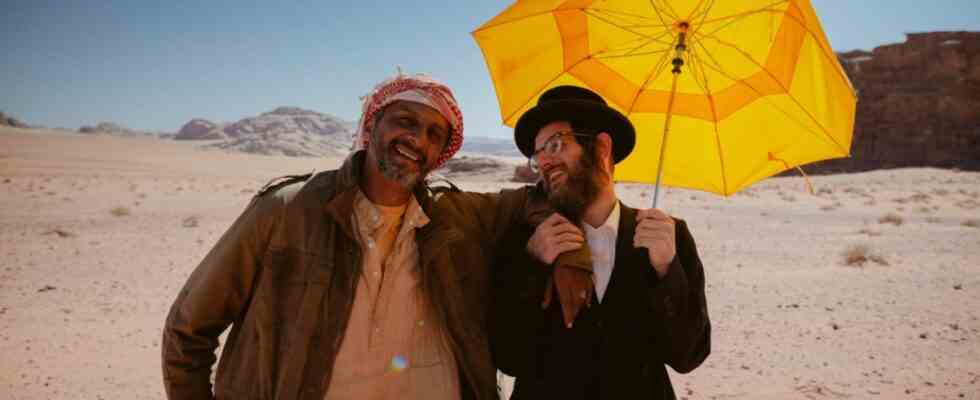It all started with the boat in the desert. In the middle of Sinai, it stood on dry land and bore the inscription “No Name Restaurant”. More than 20 years ago, the filmmaker Stefan Sarazin discovered the stranded ship on a voyage, which from then on puzzled him: how did it get there and what was the story behind it? Inspired by this accidental find in the desert, he and his colleague Peter Keller developed the idea for the film “Not Quite Kosher – A Divine Comedy” in 2010, which can now be seen in cinemas.
Until then, a long dry spell had to be overcome: in 2011, the two filmmakers received the German Screenplay Prize for the comedy about the involuntary fate of an orthodox Jew and a Bedouin who meet in the desert, but the realization of the film initially failed. It wasn’t until 2016 that producer Fritjof Hohagen from Enigma Film decided to get involved in the project and to realize it – “a marathon run”, as he describes the undertaking from the original idea to shooting and completion in the Corona period. In May 2022, the comedy Hohagen brought the Bavarian Film Prize in the Production category.
“A marathon run,” says producer Fritjof Hohagen about the film project in the desert.
(Photo: Enigma Movie 2019)
In the film, the orthodox Jew Ben and the Bedouin Adel meet in the desert. Wanting to escape his clan’s matchmaking attempts, Ben agrees to save the Jewish community in Alexandria who are missing a tenth man to celebrate Passover. After being forced off the bus in the middle of nowhere, he meets the grumpy noble looking for his camel. The different origins of the two put their tolerance to the test and make them traveling companions who soon have to fight for their survival and have better things to do than to live up to the prejudices of their counterparts.
“‘Not quite kosher’ offered the opportunity to tell a relevant topic in a lighter way,” says Hohagen about the appeal of the project for him. The producer shot the drama “Fata Morgana” with Matthias Schweighöfer in Morocco in 2007 and was “very experienced and damaged in the desert, but also enthusiastic,” as he put it in the interview. This experience and his hands-on mentality benefited the film, whose main protagonists were two men in front of and two behind the camera.
“Lawrence of Arabia” and “Dune” were also filmed in Wadi Rum
Filming took place in Israel, Palestine and Jordan. The “heart of the film”, as Hohagen calls the desert scenes, was realized in Jordan’s Wadi Rum – a place that, with its reddish rock formations, not only allows for beautiful landscape shots, but is also of great film-historical importance: “Lawrence of Arabia” was once filmed here and “The Martian” were filmed, at the same time the team around director Denis Villeneuve was shooting the scifi film “Dune” there at the same time.
Hohagen and his international team penetrated deep into the Bedouin area for two weeks, where they also lived in Bedouin tents – without air conditioning and individual showers. “Logistically, it was an insane challenge,” says the producer. “We were in a place where there were no more roads and everything had to be brought in by Bedouin jeeps. It was also easy to get lost because there was no cell phone reception either.” There were also cultural differences: “We had a team of Jewish, Arabic and Christian actors and employees. In fact, we previously thought it would be easier to promote international understanding with our project. In the end everything resolved positively, but there were definitely cultural hurdles that you had to overcome,” says Hohagen.
In the amusing culture clash comedy, fairytale-like exaggeration tells of how encounters and communication can create the first step towards understanding and tolerance. “Of course, the film doesn’t solve the Middle East conflict, it’s a parable of conflicts all over the world. It creates the utopia that understanding or even rapprochement is possible when enemies meet and talk to each other,” says the producer. Although it is set in the Middle East, the film radiates a universal validity that is sadly updated by the war in Ukraine.
Hohagen’s plan to tell a soft-toned comedy for a broad audience is a complete success: “Especially at a time when many people are afraid and burdened and don’t necessarily want to deal with hard dramas, we wanted to choose a form that entertaining and has a certain tongue in cheek,” says the producer. The effort of having a real boat towed from Akaba in Jordan into the desert is also justified. Hohagen would have liked to leave that there. But it can only be seen on the screen.

